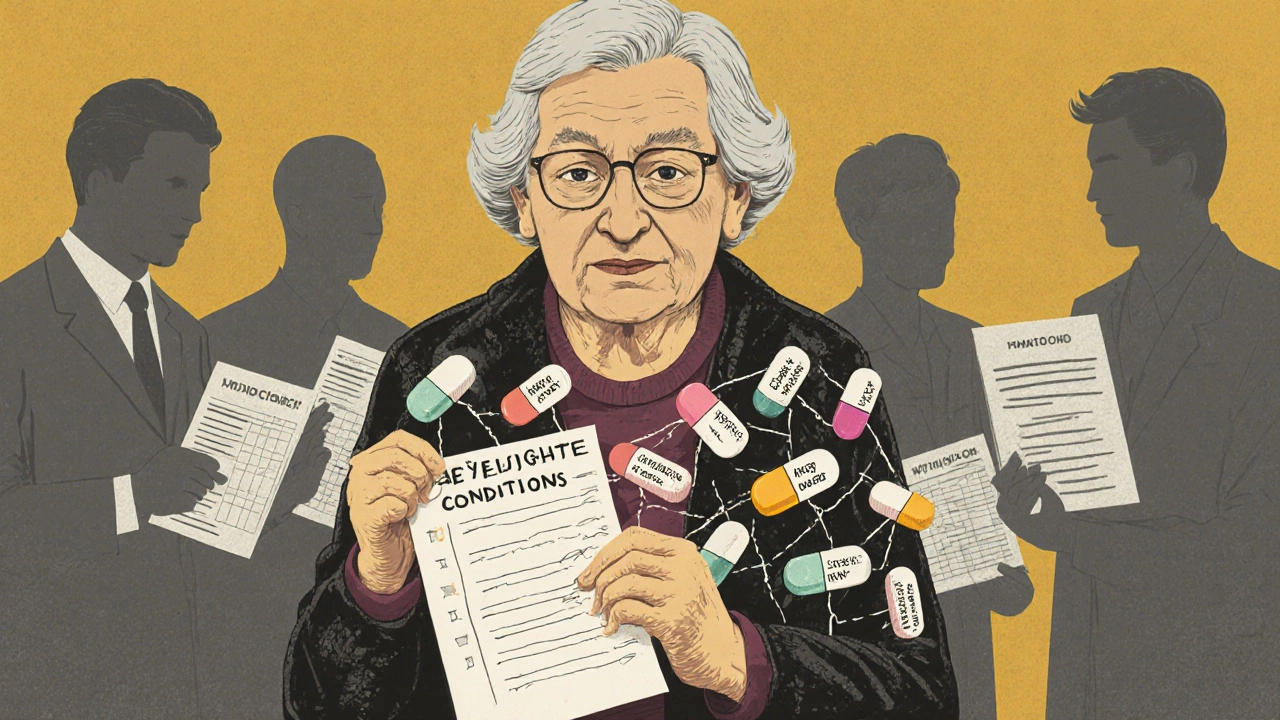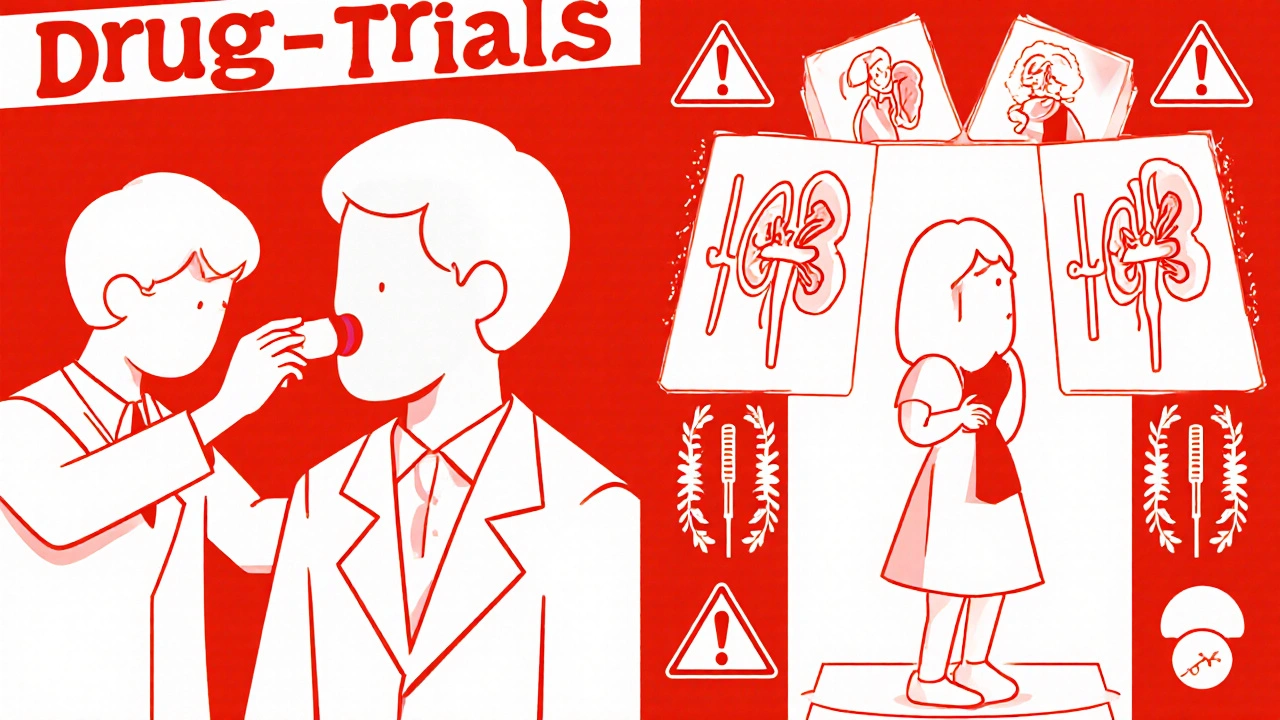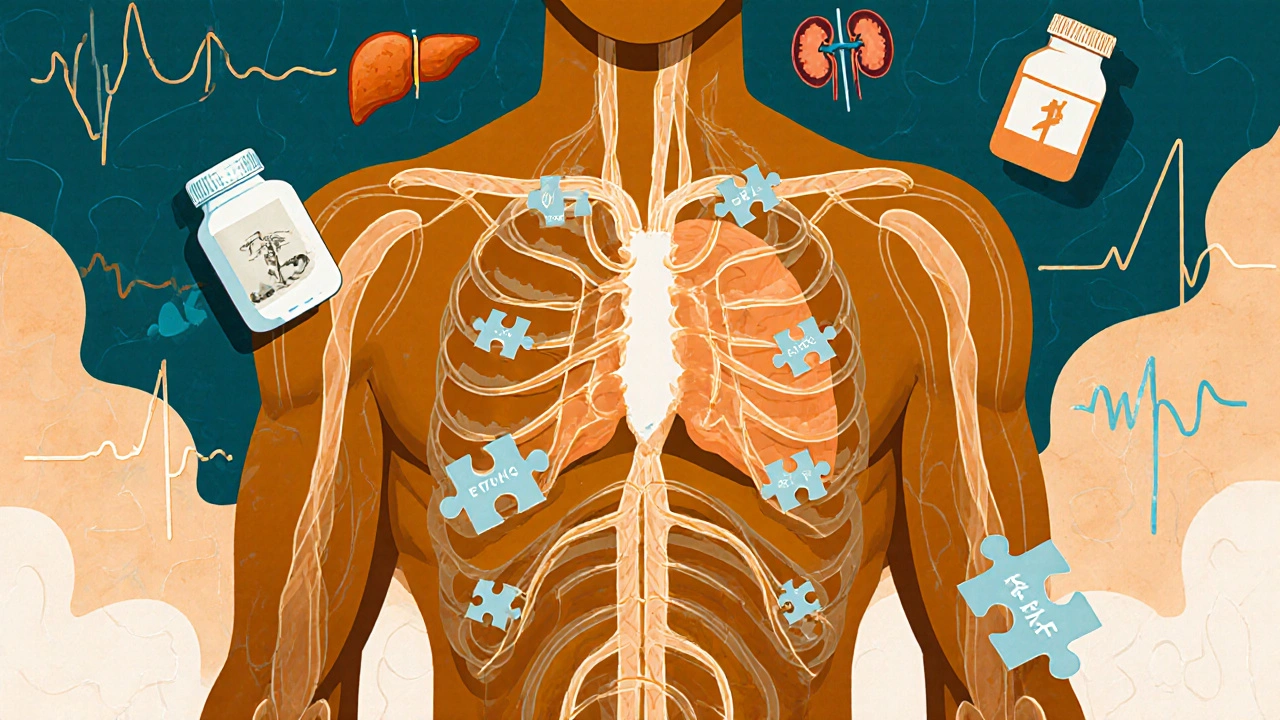Medication Safety Risk Checker
Based on your information, your risk of medication side effects is .
This is calculated from your medical history, current medications, and age.
What this means:
Actionable Recommendations
Based on your risk assessment, we recommend:
- Speak to your doctor about a medication review every 6 months
- Keep a detailed medication list with dosages and purposes
- Discuss any past reactions with your healthcare provider
Every time you take a new pill, your body doesn’t start from scratch. It remembers. Your medical history - the conditions you’ve had, the drugs you’ve taken, your age, even your gender - shapes how your body reacts to medicine today. It’s not just about what’s in the bottle. It’s about what’s in your story.
Why Your Past Medications Matter More Than You Think
If you’ve ever had a bad reaction to a drug, your risk of reacting to similar ones goes up. That’s not a guess. It’s science. A 2009 study found that people who had an adverse reaction to one drug class were 30-40% more likely to react to another drug in the same family. For example, if you’re allergic to penicillin, your chance of reacting to cephalosporins - a different antibiotic - jumps eight times higher. This isn’t rare. It’s predictable.
Doctors don’t always ask about old reactions. Patients forget. But that gap can be deadly. One patient might say, "I had a rash once with amoxicillin," and the next time they’re prescribed a similar drug, the connection gets missed. That rash? It wasn’t just a nuisance. It was a warning sign your immune system already flagged.
Polypharmacy: The Silent Risk Multiplier
Taking five or more medications at once isn’t uncommon - especially if you’re managing chronic conditions like diabetes, high blood pressure, or arthritis. But it’s dangerous. According to the British Heart Foundation, people on five to nine drugs are almost twice as likely to have an adverse reaction compared to those on fewer. If you’re on ten or more? Your risk triples.
Each extra pill adds about 7-10% more risk. That’s not because the drugs are weak. It’s because they interact. Warfarin, a blood thinner, mixed with common painkillers like ibuprofen, can cause dangerous bleeding. That combo alone sends 34,000 Americans to the ER every year. And most of these interactions aren’t random. They’re predictable if your full medication list is known.
Here’s the problem: only 35% of electronic health records properly flag these risks when a doctor writes a prescription. That means two out of three times, your doctor might not even see the red flags.
Your Body’s Internal Systems Are Already Under Stress
Your liver and kidneys don’t just process drugs - they clean them out. If those organs are damaged, the drugs stay in your system longer. That turns a normal dose into an overdose.
Chronic kidney disease cuts your kidney’s ability to clear drugs by 50-75%. That means standard doses of common medications - like metformin for diabetes or certain antibiotics - become toxic. The American Medical Association says 40% of commonly prescribed drugs need dose changes for kidney patients. Yet, a Johns Hopkins study found that 65% of prescriptions for these patients don’t get adjusted.
Same goes for your liver. Genetic differences in enzymes like CYP450 can make your body break down drugs 30% slower - or 500% faster. That’s not a guess. It’s measured. Someone with a slow CYP2D6 variant might turn a standard dose of codeine into a dangerous morphine overdose. Others might clear it too fast, making the drug useless.

Age Isn’t Just a Number - It’s a Pharmacological Factor
If you’re over 65, your body handles drugs differently. Muscle mass drops. Fat increases. Blood flow slows. Your liver and kidneys don’t work as hard. All of this means drugs stick around longer and build up in your system.
According to the American Geriatrics Society, older adults experience 3 to 5 times more adverse reactions than younger people. And it’s not just about taking more pills. It’s about how your body changes. A 2020 study in Pakistan found people over 60 were nearly twice as likely to have a medication error. That’s not because they’re careless. It’s because their physiology changed, and their prescriptions didn’t.
And here’s something rarely talked about: older women are hit harder. The British Heart Foundation reports women over 65 have at least 50% more adverse reactions than men. Why? Because most drug trials until recently were done mostly on men. Between 2010 and 2020, women made up only 22% of participants in heart drug studies. So the dosing guidelines? They were built for male bodies. Women often get too much - and pay the price with dizziness, falls, or kidney stress.
Chronic Conditions Multiply the Risk
Having one chronic illness increases your risk. Having three or more? That’s a different level of danger. The same 2020 study found patients with multiple conditions had 2.6 times higher odds of a medication error. Why? Because each condition adds more drugs, more organ stress, and more potential for overlap.
Take someone with heart failure, diabetes, and arthritis. They might be on beta-blockers, insulin, and NSAIDs. Beta-blockers can hide symptoms of low blood sugar. NSAIDs can worsen kidney function and interfere with blood pressure meds. Insulin needs careful timing. One wrong dose, one missed meal, one unadjusted pill - and you’re in the hospital.
And here’s the twist: some side effects look exactly like disease symptoms. A corticosteroid can mask the pain of a perforated ulcer. Beta-blockers can hide a racing heart during internal bleeding. If your doctor doesn’t know your full history, they might think you’re getting worse - when you’re just reacting to a drug.

Cost Makes You Skip Pills - And That’s Risky Too
One in four patients skip doses because they can’t afford them. That sounds harmless - until you restart. When you stop a drug and then restart without a proper ramp-up, your body doesn’t know how to handle it. The 2022 Annals of Internal Medicine study of over 12,000 Medicare patients found that people who skipped doses had 37% higher treatment failure rates and 28% more side effects when they restarted.
Why? Because your body adapts. You build tolerance. You forget the right dose. You take what’s left in the bottle. That’s how you end up taking a double dose after a week off - and crashing your system.
What Can You Do? Three Simple Steps
You can’t change your past. But you can control how it’s used today.
- Keep a real-time list - Not just the names. Write down the dose, why you take it, and when you started. Include vitamins, supplements, and over-the-counter drugs. Update it every time something changes.
- Ask for a medication review - Every six months, ask your doctor or pharmacist: "Are all these still necessary?" Structured reviews with deprescribing reduce side effects by 22%. Yet only 18% of eligible patients get them.
- Speak up about past reactions - If you ever had a rash, nausea, dizziness, or weird feeling after a drug, say it. Even if it was years ago. Even if you think it was "just a coincidence." That’s your body’s history speaking.
There’s new tech coming - like genetic tests that check how your body metabolizes drugs. The FDA approved YouScript, which looks at 27 gene-drug interactions. It can cut side effects by 34% for people with the right variants. But only 5.7% of U.S. clinics use it. So don’t wait for tech. Use what’s already available: your own history.
Final Thought: Your History Is Your Shield
Medication side effects aren’t random. They’re the result of patterns - patterns in your body, your past, your habits. The more you know about your own story, the less power those side effects have over you. Your medical history isn’t just a record. It’s your best tool for staying safe. Write it down. Share it. Use it. Because when it comes to your health, the most powerful medicine isn’t in the bottle. It’s in your memory.
Can my medical history really cause side effects even if I’m taking the right dose?
Yes. Even at the "correct" dose, your body’s history - like liver damage, kidney disease, or genetic enzyme differences - can change how fast or slow a drug is processed. A standard dose might be too strong for you, even if it’s perfect for someone else. That’s why personalized medicine matters.
How do I know if a side effect is from a drug or my condition?
Track when symptoms started. Did they begin after a new drug? Did they get worse after a dose change? Some drugs mimic disease symptoms - like steroids hiding pain or beta-blockers masking heart rate spikes. If a new symptom appears after starting a medication, assume it’s drug-related until proven otherwise. Always tell your doctor about timing.
Why do older women have more side effects than men?
Most drug trials historically used mostly male participants - only 22% of cardiovascular drug trial subjects were women between 2010 and 2020. Women have different body composition, hormone levels, and metabolism rates. Doses that work for men can be too high for women, leading to more dizziness, falls, and kidney stress. This gap is slowly closing, but the legacy remains.
Is it safe to stop a medication if I think it’s causing side effects?
Never stop abruptly without talking to your doctor. Some drugs, like blood pressure or antidepressant medications, can cause dangerous withdrawal effects. Instead, write down your symptoms, when they started, and how bad they are. Bring that list to your next appointment. Your doctor can help you taper safely or switch to a better option.
Do supplements and herbs count as part of my medical history?
Absolutely. St. John’s Wort can reduce the effect of birth control and antidepressants. Garlic and ginkgo can thin your blood like aspirin. Turmeric can interfere with diabetes meds. Many people don’t think of supplements as "medicine," but they act like drugs. Always include them in your list - even if you think they’re "natural."


Hannah Machiorlete
November 19, 2025 AT 18:56I swear my last doctor just glanced at my chart and prescribed me a new pill like it was a vending machine snack. I had a rash from amoxicillin in 2017 and never mentioned it again-until I got another one and broke out like I’d been dipped in poison. Now I keep a handwritten list taped to my fridge. No more guessing games.
Bette Rivas
November 20, 2025 AT 12:45The data on polypharmacy is overwhelmingly consistent: each additional medication increases adverse event risk by 7–10%, with a compounding effect beyond five drugs. This isn’t anecdotal-it’s pharmacokinetic. The liver’s CYP450 system has finite capacity, and when multiple substrates compete for enzymatic metabolism, plasma concentrations rise unpredictably. That’s why structured medication reviews with pharmacists reduce hospitalizations by 22%. Yet systemic inertia persists because EHRs rarely auto-flag interactions unless explicitly programmed. The solution isn’t just patient education-it’s mandatory clinical decision support integration at the point of prescribing.
prasad gali
November 21, 2025 AT 20:42Let’s cut through the fluff. You’re not special because you ‘had a rash once.’ If you’re on five meds and your creatinine clearance is below 60, you’re playing Russian roulette with your kidneys. The AMA says 40% of drugs need dose adjustments in renal impairment-and 65% of docs don’t do it? That’s malpractice waiting to happen. Stop blaming the system. Start demanding your labs be reviewed every 90 days. Or stop complaining when you end up in the ER.
Paige Basford
November 22, 2025 AT 08:08Okay but have you ever tried explaining to your doctor that you skipped your blood pressure meds because they cost $120 a month? And then when you finally got them again, you took two because you thought you were ‘behind’? I did that. Got dizzy for three days. My pharmacist was the one who caught it-not my doctor. She just smiled and said, ‘Honey, you’re not dumb, you’re just tired.’ I cried in the parking lot. So yeah, I keep a list now. And I text my pharmacist when I’m confused. She’s my real MVP.
Ankita Sinha
November 22, 2025 AT 11:36Guys, I just started tracking my meds after my mom had a bad reaction to a combo of ibuprofen and her heart med. She didn’t even know garlic supplements could thin blood like aspirin! Now I use a free app called Medisafe-it sends reminders, logs side effects, and even exports a PDF for appointments. I’ve been sharing it with my cousins and aunties in India. We’re all so used to just taking what’s handed to us. But we deserve better. Small steps, right? Start with one pill. Write it down. You’ve got this.
Kenneth Meyer
November 23, 2025 AT 22:17Our bodies aren’t machines with standardized settings. They’re living archives-each scar, each illness, each pill swallowed, etched into our biochemistry. The idea that a ‘correct dose’ exists in a vacuum is a myth manufactured by clinical trials that excluded the elderly, women, and people with comorbidities. We’re not outliers. We’re the majority. The real tragedy isn’t the side effects-it’s that we’ve been taught to blame ourselves for reactions that were predictable, preventable, and systemic. Your history isn’t noise. It’s signal. Listen to it.
Donald Sanchez
November 25, 2025 AT 15:38OMG I JUST REALIZED MY VITAMIN D IS MAKING MY BP SPIKE?? I’VE BEEN TAKING IT WITH MY STATIN FOR 2 YEARS 😱 I’M GONNA DIE 😭 I’M TELLING MY DR NOW. ALSO I THINK MY CBD OIL IS INTERACTING WITH MY ANTIDEPRESSANT. I’M SO SCARED. WHO ELSE IS LIKE THIS??
Abdula'aziz Muhammad Nasir
November 27, 2025 AT 08:44In Nigeria, we often rely on traditional healers and over-the-counter remedies because access to specialists is limited. But the same principles apply: know your body. Keep a simple notebook. Write the name of the medicine, why you take it, and how you feel after. Share this with any provider you see-even if they’re not a doctor. Many nurses and pharmacists are eager to help. Your life is not a gamble. Your history is your strength, not your burden.
Tara Stelluti
November 27, 2025 AT 21:24They’re all lying. The FDA, the doctors, the drug companies-they don’t want you to know how much they’re guessing. They test drugs on young, healthy men and then sell them to grandmas, pregnant women, and diabetics. And when we get sick? We’re called ‘non-compliant.’ I’ve seen three people die because their meds weren’t adjusted. This isn’t medicine. It’s a casino with white coats.
Danielle Mazur
November 28, 2025 AT 07:59Have you ever wondered why the same drugs that cause dizziness in women are never tested for fall risk in elderly populations? The pharmaceutical industry funds the studies. The results are buried. The FDA approves based on flawed data. And now we’re told to ‘speak up’? No. We need class-action lawsuits. We need mandatory gender and age stratification in trials. Until then, every pill you take is a gamble with your life.
Margaret Wilson
November 28, 2025 AT 17:22So… you’re telling me my grandma’s dizziness isn’t just ‘getting old’… it’s because she’s been on the same dose of blood pressure med since 2008? And her turmeric gummies are making it worse? AND HER DOCTOR NEVER ASKED? 😭 I’m crying. I’m calling my mom right now. And I’m printing out this whole post. This is the most important thing I’ve read all year. Thank you. 🙏